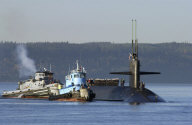
Naval Submarine Base, Bangor, WA - With the crew topside, the USS Pennsylvania is arriving to her new home port at SUBASE Bangor in Washington State, from the previous home at SUBASE Kings Bay, GA. Friends and families of the crewmembers wait with anticipation as the boat is guided pierside to Marginal Wharf.
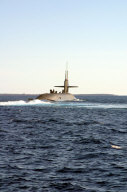
USS Florida (SSGN 728) sails off the coast of the Bahamas on January 21 during
"Giant Shadow," a Naval Sea Systems Command/Naval Submarine Forces experiment to test the capabilities of the
Navy's future SSGNs. Florida is one of four Ohio-class ballistic missile submarines to be converted to guided
missile submarines. "Giant Shadow" is the first experiment under the "Sea Trial" initiative of the Chief of
Naval Operations' Sea Power 21 vision and the first in a series of experiments before converting and
overhauling the four SSBNs to SSGNs. (U.S. Navy photo by Chief Journalist David Nagle).
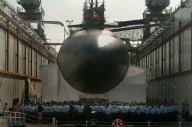
San Diego (May 16, 2003) - Adm. Vern Clark, Chief of Naval Operations (CNO),
speaks to the crew of USS Salt Lake City (SSN 716). Salt Lake City is a Los Angeles-class nuclear powered
attack submarine currently in dry dock at Naval Base Point Loma, Calif. The CNO is in San Diego visiting with
Sailors and to meet with the senior enlisted and officer leadership community. U.S. Navy photo by Chief
Photographer's Mate Johnny Bivera.
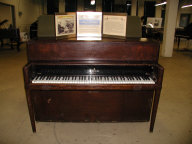
Washington Navy Yard (Jun. 11, 2003) -- This Steinway piano spent 22 years
(1961-1983) aboard the ballistic missile submarine USS Thomas A. Edison (SSBN 610), the only full size piano
ever installed aboard a submarine conducting nuclear deterrent patrols. Part of the artifact collection of
the Naval Historical Center on the Washington Navy Yard, its being temporarily loaned back to Steinway in
return for a complete restoration. It is then scheduled to go on display this summer at the Steinway Company
Museum in New York in an exhibit celebrating the 150 years of the famous piano company. Photo courtesy of
Steinway Piano Company.
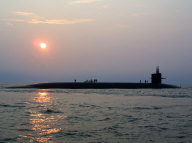
The ballistic missile submarine USS Rhode Island (SSBN 740) travels by the coast
near Norfolk, Va. as the sun rises in the background.
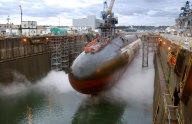
Puget Sound Naval Shipyard, Wash. (Aug. 14, 2003) -- USS Ohio (SSGN 726) is in
dry dock undergoing a conversion from a Ballistic Missile Submarine (SSBN) to a Guided Missile Submarine
(SSGN) designation. Ohio has been out of service since Oct. 29, 2002 for conversion to SSGN at Puget Sound
Naval Shipyard. Four Ohio-class strategic missile submarines, USS Ohio (SSBN 726), USS Michigan (SSBN 727)
USS Florida (SSBN 728), and USS Georgia (SSBN 729) have been selected for transformation into a new platform,
designated SSGN. The SSGNs will have the capability to support and launch up to 154 Tomahawk missiles, a
significant increase in capacity compared to other platforms. The 22 missile tubes also will provide the
capability to carry other payloads, such as unmanned underwater vehicles (UUVs), unmanned aerial vehicles
(UAVs) and Special Forces equipment. This new platform will also have the capability to carry and support
more than 66 Navy SEALs (Sea, Air and Land) and insert them clandestinely into potential conflict areas. U.S.
Navy file photo.
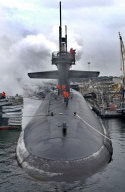
Bremerton, Wash. (Feb. 2, 2004) - The Ohio class fleet ballistic missile
submarine USS Michigan (SSBN 727) enters into the Puget sound naval shipyard and intermediate maintenance
facility to commence engineered refueling overhaul and eventual conversion from a fleet ballistic missile
submarine (SSBN) to a guided missile submarine (SSGN).
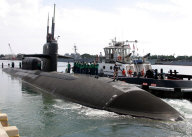
Pearl Harbor, Hawaii (Feb. 23, 2004) Ð A tug gently guides the nuclear-powered
Los Angeles-class attack submarine USS La Jolla (SSN 701) away from its pier as it heads out for a scheduled
Western Pacific deployment. The submarine is equipped with the Special Operations capable Dry Deck Shelter
(DDS), which can allow special operation forces including Navy SEALs (Sea, Air, Land) to deploy undetected
from deployed submarines. U.S. Navy photo by Journalist 3rd Class Corwin Colbert.
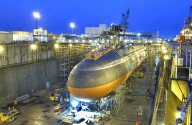
Night falls at Puget Sound Naval Shipyard and Intermediate Maintenance Facility,
Bremerton, Wash., as work continues on USS Ohio (SSGN 726). Ohio is one of four Trident submarines undergoing
conversion to a new class of guided missile submarines. (U.S. Navy photo by Wendy Hallmark, PSNS &
IMF)
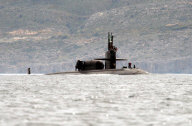
Souda Bay, Crete, Greece (Apr. 12, 2004) - The Los Angeles-class attack
submarine USS Dallas (SSN 700) arrives in Souda Bay's harbor for a brief port visit.
Commissioned in 1981, Dallas is the first Los Angeles-class submarine to have a Dry Deck Shelter (DDS), shown on the submarine's back. Dry Deck Shelters provide specially configured nuclear powered submarines with a greater capability of deploying Special Operations Forces (SOF). DDSs can transport, deploy, and recover SOF teams from Combat Rubber Raiding Crafts (CRRCs) or SEAL Delivery Vehicles (SDVs), all while remaining submerged. In an era of littoral warfare, this capability substantially enhances the combat flexibility of both the submarine and SOF personne. U.S. Navy photo by Paul Farley.
Commissioned in 1981, Dallas is the first Los Angeles-class submarine to have a Dry Deck Shelter (DDS), shown on the submarine's back. Dry Deck Shelters provide specially configured nuclear powered submarines with a greater capability of deploying Special Operations Forces (SOF). DDSs can transport, deploy, and recover SOF teams from Combat Rubber Raiding Crafts (CRRCs) or SEAL Delivery Vehicles (SDVs), all while remaining submerged. In an era of littoral warfare, this capability substantially enhances the combat flexibility of both the submarine and SOF personne. U.S. Navy photo by Paul Farley.
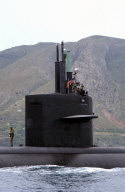
Souda Bay, Crete, Greece (Apr. 12, 2004) - The Los Angeles-class attack
submarine USS Dallas (SSN 700) arrives in Souda Bay's harbor for a brief port visit. Commissioned in 1981,
Dallas is the first Los Angeles-class submarine to have a Dry Deck Shelter (DDS). Dry Deck Shelters provide
specially configured nuclear powered submarines with a greater capability of deploying Special Operations
Forces (SOF). DDSs can transport, deploy, and recover SOF teams from Combat Rubber Raiding Crafts (CRRCs) or
SEAL Delivery Vehicles (SDVs), all while remaining submerged. In an era of littoral warfare, this capability
substantially enhances the combat flexibility of both the submarine and SOF personnel. U.S. Navy photo by
Paul Farley.
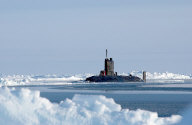
North Polar Region (Apr. 19, 2004) - The Royal Navy Trafalgar class attack
submarine HMS Tireless sits on the surface of the North Pole. Tireless surfaced with the U.S. Navy Los
Angeles-class attack submarine USS Hampton (SSN 767) for ICEX 04, a joint operational exercise beneath the
polar ice cap. Both the Tireless and Hampton crews met on the ice, including scientists traveling aboard both
submarines to collect data and perform experiments. The Ice Exercise demonstrates the U.S. and British
Submarine Force's ability to freely navigate in all international waters, including the Arctic. U.S. Navy
photo by Chief Journalist Kevin Elliott.
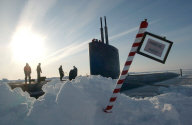
North Polar Region (Apr. 19, 2004) - The crew of the Los Angeles-class attack
submarine USS Hampton (SSN 767) posted a sign reading "North Pole" made by the crew after surfacing in the
polar ice cap region. Hampton and the Royal Navy Trafalgar class attack submarine HMS Tireless took part in
ICEX 04, a joint operational exercise beneath the polar ice cap. Both the Tireless and Hampton crews met on
the ice, including scientists traveling aboard both submarines to collect data and perform experiments. The
Ice Exercise demonstrates the U.S. and British Submarine Force's ability to freely navigate in all
international waters, including the Arctic. U.S. Navy photo by Chief Journalist Kevin Elliott.
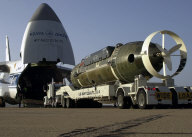
Naval Air Station North Island, Calif, (April 29, 1999) - Deep Submergence
Rescue Vehicles (DSRV) Mystic is carefully loaded onto a Russian built Antonov An-124 Condor by sailors from
Deep Submergence Unit (DSU) and the aircraft's crew. The An-124 is owned and operated by the Volga-Dnepr
Group based in Russia. The Mystic and 13 members of its crew are being flown to the Republic of Korea to
participate in exercise Pacific Reach. U.S. Navy photo by Photographer's Mate 1st Class Daniel N.
Woods
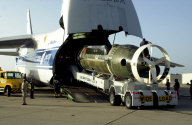
Naval Air Station North Island, Calif, (April 29, 1999) - Deep Submergence
Rescue Vehicles (DSRV) Mystic is carefully loaded onto a Russian built Antonov An-124 Condor by sailors from
Deep Submergence Unit (DSU) and the aircraft's crew. The An-124 is owned and operated by the Volga-Dnepr
Group based in Russia. The Mystic and 13 members of its crew are being flown to the Republic of Korea to
participate in exercise Pacific Reach. U.S. Navy photo by Photographer's Mate 1st Class Daniel N.
Woods
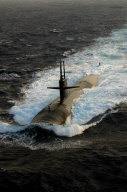
Atlantic Ocean (July 12, 2004) -- The Los Angeles class submarine USS
Albuquerque (SSN 706) surfaces in the Atlantic Ocean while participating in Majestic Eagle 2004. Majestic
Eagle is a multinational exercise involving multiple allied nations working side by side in a realistic and
challenging training environment to prepare for and conduct integrated operations with multiple aircraft
carriers and other vessels. Official U.S. Navy photo by Photographer's Mate Airman Rob Gaston. Image released
by LT. K.R. Stephens, PAO-CVN-65.
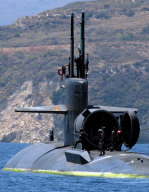
Souda Bay, Crete, Greece (Jul. 19, 2004) -- USS Dallas (SSN 700) departs Souda
harbor following a brief port visit. USS Dallas is homported in Groton, CT and currently on a routine
deployment.
Commissioned in 1981 The USS Dallas (SSN 700) is the first Los Angeles class submarine to have a dry deck shelter. Dry Deck Shelters provide specially configured nuclear powered submarines with a greater capability of deploying Special Operations Forces (SOF). DDSs can transport, deploy, and recover SOF teams from Combat Rubber Raiding Crafts (CRRCs) or SEAL Delivery Vehicles (SDVs), all while remaining submerged. In an era of littoral warfare, this capability substantially enhances the combat flexibility of both the submarine and SOF personnel.
U.S. Navy photo by Paul Farley.
Commissioned in 1981 The USS Dallas (SSN 700) is the first Los Angeles class submarine to have a dry deck shelter. Dry Deck Shelters provide specially configured nuclear powered submarines with a greater capability of deploying Special Operations Forces (SOF). DDSs can transport, deploy, and recover SOF teams from Combat Rubber Raiding Crafts (CRRCs) or SEAL Delivery Vehicles (SDVs), all while remaining submerged. In an era of littoral warfare, this capability substantially enhances the combat flexibility of both the submarine and SOF personnel.
U.S. Navy photo by Paul Farley.
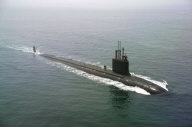
Groton, Conn. (July 30, 2004) - The nation's newest and most advanced
nuclear-powered attack submarine and the lead ship of its class, PCU Virginia (SSN 774) returns to the
General Dynamics Electric Boat shipyard following the successful completion of its first voyage in open seas
called "alpha" sea trials. Virginia is the Navy's only major combatant ready to join the fleet that was
designed with the post-Cold War security environment in mind and embodies the war fighting and operational
capabilities required to dominate the littorals while maintaining undersea dominance in the open ocean.
Virginia and the rest of the ships of its class are designed specifically to incorporate emergent
technologies that will provide new capabilities to meet new threats. Virginia will be delivered to the U.S.
Navy this fall. U.S. Navy photo by General Dynamics Electric Boat
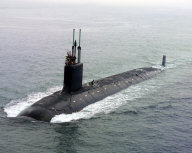
GROTON, Conn. (July 30, 2004) - PCU Virginia (SSN-774), the nation's newest and
most advanced nuclear-powered attack submarine and the lead ship of its class, returns to the General
Dynamics Electric Boat shipyard in Groton, Conn., July 30, following the successful completion of its first
voyage in open seas ñ called "alpha" sea trials. Virginia is the Navy's only major combatant ready to join
the fleet that was designed with the post-Cold War security environment in mind and embodies the warfighting
and operational capabilities required to dominate the littorals while maintaining undersea dominance in the
open ocean. "Nuclear submarines provide a unique contribution to our nation's security and will be
increasingly important in the decades ahead," said Electric Boat President John Casey. "The Virginia and
the rest of the ships of its class are designed specifically to incorporate emergent technologies that will
provide new capabilities to meet new threats." Virginia will be delivered to the U.S. Navy this fall.
Electric Boat is a wholly owned subsidiary of General Dynamics.
(Photo courtesy of General Dynamics Electric Boat Public Affairs)
(Photo courtesy of General Dynamics Electric Boat Public Affairs)
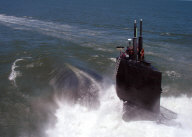
Chesapeake Bay(30 July 04)
The USS Albany (SSN-753) returning from a routine six month deployment, transits the Chesapeake Bay as seen through the door of a HC-60S Knight Hawk Helicopter. USS Albany is US Navy photo by Photographer's Mate 2nd Class (SW) Steven J. Weber.
The USS Albany (SSN-753) returning from a routine six month deployment, transits the Chesapeake Bay as seen through the door of a HC-60S Knight Hawk Helicopter. USS Albany is US Navy photo by Photographer's Mate 2nd Class (SW) Steven J. Weber.
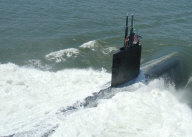
Chesapeake Bay(30 July 04)
The USS Albany (SSN-753) returning from a routine six month deployment, transits the Chesapeake Bay as seen through the door of a HC-60S Knight Hawk Helicopter. USS Albany is US Navy photo by Photographer's Mate 2nd Class (SW) Steven J. Weber.
The USS Albany (SSN-753) returning from a routine six month deployment, transits the Chesapeake Bay as seen through the door of a HC-60S Knight Hawk Helicopter. USS Albany is US Navy photo by Photographer's Mate 2nd Class (SW) Steven J. Weber.
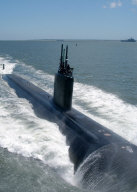
Chesapeake Bay(30 July 04)
The USS Albany (SSN-753) returning from a routine six month deployment, transits the Chesapeake Bay as seen through the door of a HC-60S Knight Hawk Helicopter. USS Albany is US Navy photo by Photographer's Mate 2nd Class (SW) Steven J. Weber.
The USS Albany (SSN-753) returning from a routine six month deployment, transits the Chesapeake Bay as seen through the door of a HC-60S Knight Hawk Helicopter. USS Albany is US Navy photo by Photographer's Mate 2nd Class (SW) Steven J. Weber.
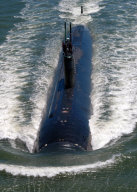
Chesapeake Bay(30 July 04)
The USS Albany (SSN-753) returning from a routine six month deployment, transits the Chesapeake Bay as seen through the door of a HC-60S Knight Hawk Helicopter. USS Albany is US Navy photo by Photographer's Mate 2nd Class (SW) Steven J. Weber.
The USS Albany (SSN-753) returning from a routine six month deployment, transits the Chesapeake Bay as seen through the door of a HC-60S Knight Hawk Helicopter. USS Albany is US Navy photo by Photographer's Mate 2nd Class (SW) Steven J. Weber.
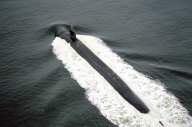
Kings Bay, Georgia (Feb. 23, 1995) -- A port quarter aerial view of the
nuclear-powered Ohio-class ballistic missile submarine USS Nebraska (SSBN 739) underway in the Atlantic. U.S.
Navy photo by Photographer's Mate 3rd Class Christian Viera.
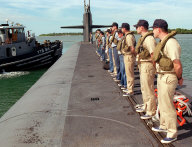
OAHU, Hawaii (May 8, 1997) -- Crewmembers aboard the ballistic missile
submarine USS Florida (SSBN 728) prepare to cast-off from the fleet tug boat USS Aukele (YTB 814) near the
coast of Oahu, Hawaii. U.S. Navy photo by Photographer's Mate 3rd Class Diamond.
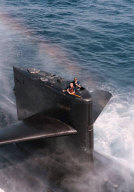
Crewman on board the U.S. Navy's Los Angeles-class attack submarine USS
Baltimore (SSN 704) stand by with a grappling hook to snag a mail shipment being lowered by an SH-60
"Seahawk" helicopter from Anti-Submarine Squadron Five (HS-5) July 17, 1996. The Baltimore is part of the
aircraft carrier USS George Washington (CVN 73) Battle Group, which is just days away from completing their
scheduled six-month deployment in the Mediterranean. The George Washington will be returning to homeport,
July 23rd after completing a scheduled six-month deployment to the Mediterranean, which included sustained
operations in support of the NATO-led peacekeeping in Bosnia and UN sanctions against Iraq in the Arabian
Gulf. U.S. Navy photo by Photographer's Mate 3rd Class Chris Vickers